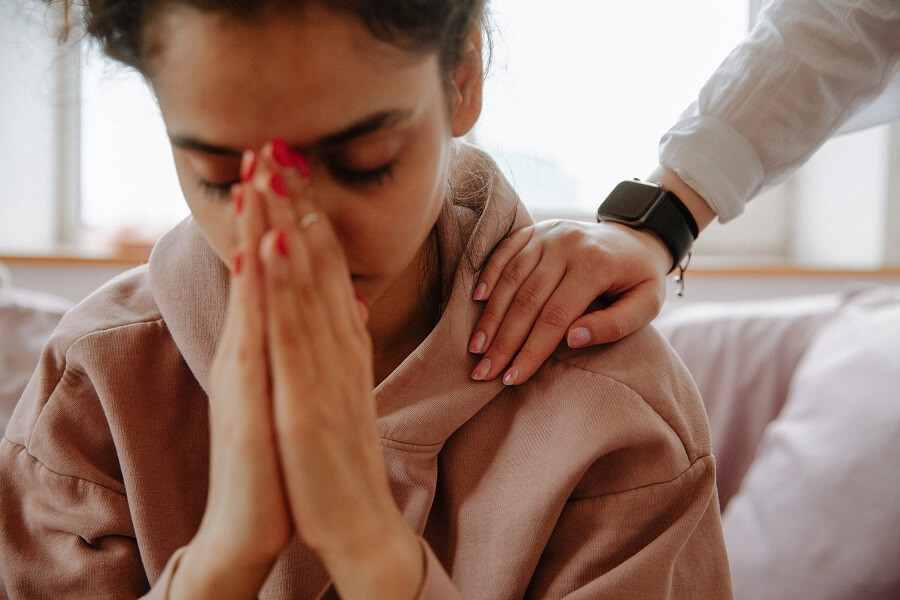Depression is a mental illness that can affect anyone at any time in their lives. It’s a complex condition to cope with whether you are impacted by it personally or know a friend or family member affected by it.
When people have depression, it can be hard for them to openly express how they feel for fear of being judged, ignored, or not receiving the help they need. This fear can force people to put on a mask of being okay and can push them to hide away from the world. Because of this, it’s vitally important to know and understand the potential signs of depression so you can spot them in your loved ones and offer the proper support.
With depression on the rise, it’s more important than ever to understand it, what it can look like, and how to offer proper support to friends and family members who may be struggling with it.
How to Spot Signs of Depression
Clinical depression is a mental illness that involves prolonged periods of feeling ‘down’. It can last for weeks or even months, and it can be recurring for a lot of people – so, for example, symptoms might lessen considerably for a few days before coming back for weeks. Despite having much less stigma attached to it than it used to, many people don’t understand that depression isn’t something that will go away on its own, and sufferers need a lot of support and treatment[i].
What can cause it?
Depression doesn’t necessarily have a cause and it can be triggered for many reasons. It might be caused by a series of events in someone’s life or one significant, stressful event.
Many people experience depression as a downwards spiral or a slippery slope, where one event triggers depression, and it just seems to get worse from there. Some reasons the risk of developing depression might increase include[ii]:
A stressful or traumatic event
Any stressful event such as a bereavement, a breakup or witnessing trauma can lead to depression, especially if the person affected by the event withdraws from their family and friends.
Loneliness
Feeling lonely can make every negative emotion 10x worse, and loneliness is an intensely complex feeling to deal with. Feeling lonely can significantly increase the risk of depression.
Read about coping with loneliness and isolation here
Illness and injuries
When people are ill or have sustained an injury, it usually means that everyday life stops. Their illness or injury may cause them to become isolated, frustrated and depressed. The risk of depression increases even more when the illness or injury is longstanding with no end in sight.
Drug and alcohol use
The use of drugs and alcohol can increase the risk of depression. Although they may make someone feel better in the short term, the adverse effects are substantial.
You might also be more at risk of developing depression if someone in your family has it, or if you have certain personality traits such as being very self-critical or having a low self-esteem.
What does depression look like?
Depression can feel different from person to person. Although the primary symptoms are the same, they affect everyone’s lives in different ways. It can present both physically and emotionally, and it affects peoples day-to-day lives.
On the outside, the symptoms of depression can come across differently. If someone is depressed, you might notice[iii]:
Emotions
Someone with depression will have a mix of emotions happening all at once. An outsider might notice the following:
- They can’t control their emotions
- They get irritable over small things
- They seem distant and disconnected
Internally, they may be feeling:
- Chronically sad and upset
- Suicidal, or that life isn’t worth living
- Angry and frustrated
- Fed up, and like they are stuck
- Guilty for feeling down
Avoidance and lack of interest
When someone has depression, they may start avoiding many things that they don’t have the energy to do or situations that might cause them anxiety. They could also feel they aren’t wanted or don’t ‘deserve’ to be involved. You might notice that:
- They try to avoid talking about their lives
- They cancel all, or most, plans – or just don’t make plans at all
- They avoid answering questions about how they are
- They don’t turn up to school, work or appointments
- Less interest in activities they usually enjoy
Physical effects
Depression, although widely known as a mental illness, can present a lot of physical symptoms. You might notice:
- They are always tired
- They lose weight or have no appetite
- They have very low levels of energy
- They might speak and move slower than usual
Other symptoms experienced by the affected person might include:
- Pains and aches throughout the body that can’t be explained
- Difficulty sleeping, or waking up repeatedly in the night
How to help someone with depression
If you think a friend or loved one has signs of depression, there are ways you can help. It’s important to remember not to be judgemental and to approach them delicately. They may not even realise that they behave differently and might not have acknowledged their feelings yet[iv].
- Speak openly – someone with depression might feel like they can’t talk about their emotions without being judged. If you talk openly about depression and mental health, they will know you are a safe person to talk to.
- Listen – the best thing you can do when someone is feeling low is to let them speak and listen to what they have to say. Even if they can’t make sense of their feelings, it will feel good to get them out there.
- Stay in touch – when someone is depressed, they may find it hard to reach out and stay in contact. Try to make time to say hello and have a chat – even if it’s just a text.
- Be thoughtful – when you’re feeling low, simple, thoughtful acts can make a world of difference. If someone is depressed because they have a long-term illness, ask them if they need someone to shop, cook or clean for them a few times a week. If they have had a recent bereavement, gifting them some ashes jewellery to remember their loved one will help them to feel understood and looked after.
- Be supportive – when they are ready to get help, support them in any way that you can. Support them in seeking help, and let them know you’ll be there every step of the way.
- Educate yourself – depression is still very misunderstood. Another way you can help is to educate yourself on what it is to have a greater understanding of what a depressed loved one might be going through.
What not to do
It can be easy to cross the fine line between helpful and overbearing, especially when you’re dealing with someone who might be emotionally vulnerable.
Before stepping in to help someone with depression, make sure you are wary not to do the following:
- Try to fix them – because they don’t need to be fixed. Depression can happen to anyone, and making them feel damaged or like they aren’t normal will make them feel more excluded.
- Force help – if someone isn’t ready for help, the worst thing you can do is try to force it upon them. Just be there when they need you.
- Invalidate them – don’t make them think their feelings are invalid. Stay away from phrases like “at least…”, and “it could be worse…”.
- Compare – comparing your experiences to theirs may seem helpful, but it can come across as you invalidating how they are feeling. Avoid saying things like “I know how you feel”, and “we’ve all been there.” Instead, try to say “I’m here for you” and “I can’t imagine how you feel, but I’m here when you’re ready to talk about it.”
Remember to look after yourself too
When we put a lot of energy into helping someone else, it’s easy to forget about our own needs. Make sure you take time to step back and look after your own mental health.
References
MIND. (n.d.). Seeking help for a mental health problem. Retrieved from MIND: https://www.mind.org.uk/information-support/guides-to-support-and-services/seeking-help-for-a-mental-health-problem/helping-someone-else-seek-help/
NHS. (2021, April). Overview – Clinical depression. Retrieved from NHS: https://www.nhs.uk/mental-health/conditions/clinical-depression/overview/
NHS. (n.d.). Causes. Retrieved from NHS: https://www.nhs.uk/mental-health/conditions/clinical-depression/causes/
NHS. (n.d.). Symptoms – Clinical depression. Retrieved from NHS: https://www.nhs.uk/mental-health/conditions/clinical-depression/symptoms/
Sources
[i] https://www.nhs.uk/mental-health/conditions/clinical-depression/overview/
[ii] https://www.nhs.uk/mental-health/conditions/clinical-depression/causes/
[iii] https://www.nhs.uk/mental-health/conditions/clinical-depression/symptoms/
[iv] https://www.mind.org.uk/information-support/guides-to-support-and-services/seeking-help-for-a-mental-health-problem/helping-someone-else-seek-help/

